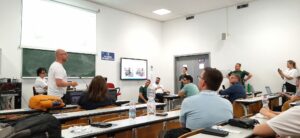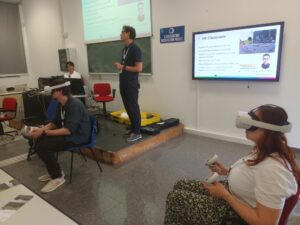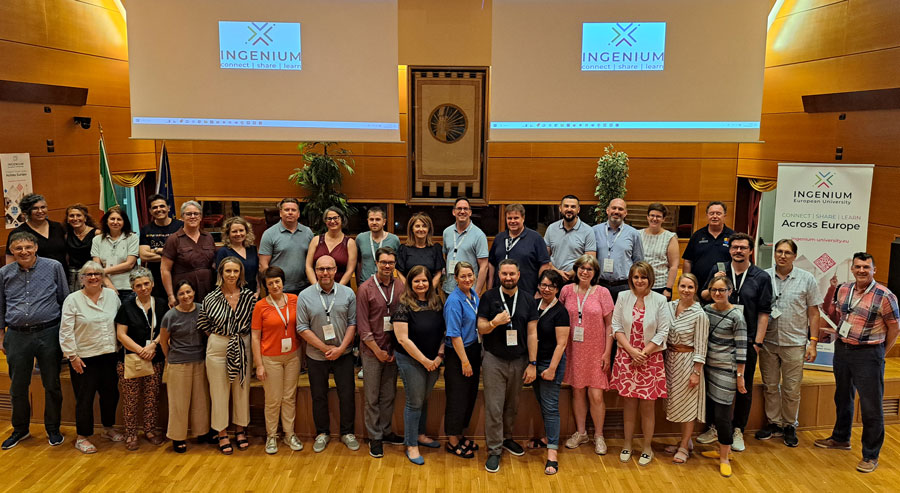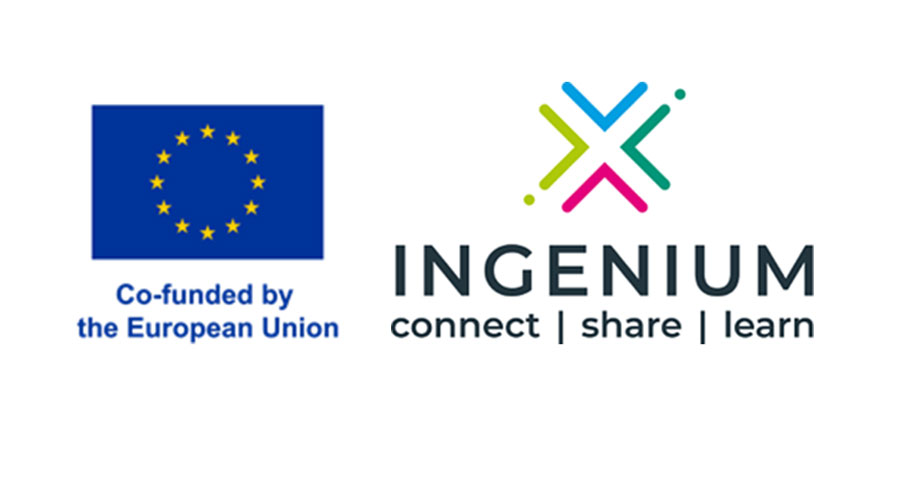Xamk facilitated the first-ever Staff Academy event at the University ‘G. d’Annunzio’, Chieti-Pescara, Ud’A in Italy from the 19 –23 of June 2023 as part of the 10 Days of INGENIUM.
The goal of the Staff Academy is to share, transfer and showcase selected innovative pedagogical methodologies from each of the partner Universities. We had ten super interesting workshops and lectures by innovative pedagogical experts across Europe! There were over 75 participants in Italy, and even more people followed the sessions online.
So, let’s dive into some cutting-edge pedagogical practices we explored together in Italy!
University of Oviedo, UNIOVI
In her session, María José Azaustre Fernandez from the University of Oviedo introduced New Technologies and Resources on the Teaching-Learning of Roman Law. She presented different teaching techniques, such as the COIL model, mock trials, and various games within a virtual campus. It was interesting to see how modern teaching environments developed during the pandemic can be used to improve comparative law teaching in the future.
Gheorghe Asachi Technical University of Iasi, TUIASI
Marcel Roman from the Gheorghe Asachi Technical University of Iasi presented the MathE project, an online learning environment dedicated to teaching mathematics. He explained how the MathE platform has a vast collection of resources which students can use to assess their mathematical competence and helps them address any shortcomings. The transnational platform is maintained and developed by mathematicians from Portugal, Italy, Ireland, Lithuania, and Romania.
University ‘G. d’Annunzio’, Chieti-Pescara, Ud’A
Maila Pentucci Chiara Laici from the University ‘G. d’Annunzio’, Chieti-Pescara, Ud’A explored the topic of generative feedback in integrated learning ecosystems for higher education. This workshop presented the peer review and peer feedback activity, highlighting students’ perceptions of its effectiveness, the differences between teacher feedback and peer feedback, and the understanding of the role of peer feedback in the formative process. Maila also presented several excellent digital tools to use in large classroom situations.

South-Eastern Finland University of Applied Sciences, Xamk
Xamk representatives Hannu Salonen and Jarno Hämäläinen had the case of simulation pedagogy for paramedic education. The case attracted much interest and received much positive feedback for its engaging teaching methods and the transferability of the simulation to other disciplines and fields. They placed a great deal of emphasis on the value of non-judgmental feedback to improve students’ confidence and practical ability, particularly during the debriefing process.
Karlsruhe University of Applied Sciences, HKA

Matthias Wölfel, with assistance from Daniel Hepperle from Karlsruhe University of Applied Sciences, HKA, gave an incredibly engaging hands-on workshop for teaching and learning in immersive Virtual Reality. They demonstrated the virtual classroom, and some do’s and don’ts of teaching and learning in a virtual environment.
University of Crete, UoC
From the University of Crete, UoC, Kallia Katsampoxaki-Hodgetts’ interactive workshop addressed how to meet inclusive learning outcomes with constructive alignment. She challenged the workshop participants to reflect on learning barriers and brainstorm how to overcome them. The good practices shared in the session allowed many to think about how to adapt their teaching practices to improve student motivation, representation, active involvement and learning!
Munster Technological University, MTU
In their presentation, Catherine Murphy and Denise McSweeney shared their best practices from their project on innovative teaching and learning approaches for internships and practice work-based training. Using actors and cameras in a role-play scenario allowed students to practice interviews, get valuable feedback on their performance, and improve their chances of landing a great internship placement. Throughout the internship, the trainers were in contact with employers and were able to pass on feedback to the students. This hands-on approach to work placements will surely prepare students to become more effective workers in their future employment prospects.
Medical University Sofia, MUS
Karolina Lubomirova presented the different teaching approaches used in the Faculty of Public Health at the Medical University of Sofia, MUS, to address the challenges of Bulgaria’s public health care system. She walked us through how the different data-driven clinical guidelines in pediatric patient care in Emergency departments are taught and can be improved during the training process using e-learning technologies.
University of Rouen, Normandy, URN
Judit Vari and Emilien Lecoffre from the University of Rouen, Normandy, URN brought serious games into the classroom. They demonstrated the game Quantum Prisoner and allowed us to test it out. Through play, we learnt computer skills, logical problem-solving skills, as well as knowledge about chemical reactions. Using serious games in teaching and learning environments can help improve the development of soft skills alongside concrete knowledge and traditional learning outcomes.
University of Skövde, HIS
From the University of Skövde, HIS, we had an interactive workshop delivered by Ines Nikšić on using the web-based tool Mentimeter in the classroom to improve active learning and formative feedback when teaching. She demonstrated a variety of options within the tool to enhance student engagement within heterogeneous groups. This would be especially valuable when dealing with large lecture groups gaining real-time audience feedback allowing every student to be heard and ask questions regardless of class size.
In addition to sharing innovative teaching methods, participants appreciated interactive activities and discussions. They felt that Staff Academy positively impacts their work or professional development. This feedback empowered us to create an open European-wide teacher community where we can share knowledge and learn together in workshops, webinars, and training sessions as part of Xamk’s internationalization strategy.
In 2024, the Staff Academies will be held at the University of Crete, UoC, in February, and at the Gheorghe Asachi Technical University of Iasi, TUIASI, in May.



